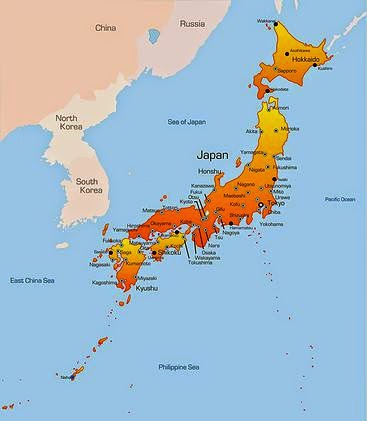With Four
major islands-Hokkaido, Honshu and Shikoku, as well as thousands of
other smaller ones, Japan has a total land area of approximately 145,370
square miles.
Japan’s
population of over 126 million makes it the ninth largest nation in the
world. Still, when thee amount of usable land in Japan is much smaller
than it looks on the map. Japan has the second highest population
density per square mile of the world’s ten most populated countries.
Because the islands are extremely mountainous and contain few plains,
nearly the entire population lives on about a sixth of Japan’s
considered mountainous. In Honshu, Alps soar as high as 10,000 feet.
Mount Fuji is found in the same part as Japanese Alps. It is an extinct
volcano that has a height of 12,389 feet and is Japan’s most famous
geographic symbol.
Japan has
a temperate climate with most great cities on the main island of Honshu
experiencing temperatures between 38.6 ˚F and 79.7 ˚F. Vegetables and
rice constitute Japan’s largest crops. No part of Japan is over seventy
miles from the sea, and Japan has a total of 16,800 miles of coastline
as well as a large inland sea which has always been a wonderful source
of food. In traditional Japanese cuisine, it is most unusual to eat a
meal that does not include some kind of food from the sea.
There are
hazards of being Japanese with an average of 7,500 earthquakes recorded
annually and approximately 1500 of them being felt by people. As if
earthquakes are not enough, the Japanese must deal annually with an
average of six to seven tropical cyclones better known as typhoons. Even
with a long list of ill-fated aspects of Japanese life, a life
expectancy of almost seventy-seven years for men and eighty-three years
for women made the Japanese one of the most long-lived people in the
world.
JAPAN’S PREHISTORY
By the
time of Yamato rulers, elements of religious practices that are now
known as Shinto (meaning “way of the Gods”) were already present. The
religion is built around nature worship and presence of spirits.
Buddhism is also a religion practiced by some Japanese people since it
was introduced to them from the Asian mainland.
The Famous Mount Fuji
A Shinto Temple
Rice Terraces
Densely Populated Tokyo
Sea Life in Japan
Sushi







Japan is very beautiful. Looking forward to a post on the 1945 Hiroshima and Nagasaki events.
ReplyDeleteThat will be coming up very soon, please research as well so that you can help add more information
ReplyDeletewill do so
ReplyDeleteThe sea life there is so beautiful. i wish we had many of those in Kenya
ReplyDelete